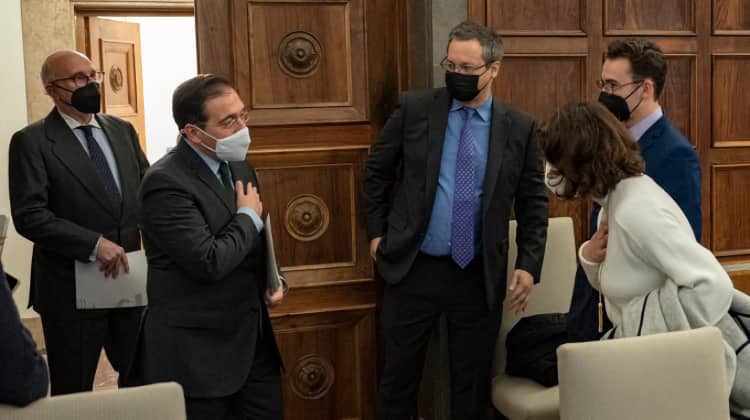The Diplomat
The Minister of Foreign Affairs, José Manuel Albares, accompanied by the Secretary of State for Latin America and the Caribbean, Juan Fernández-Trigo, yesterday received a group of relatives of political prisoners in Nicaragua in his office.
As reported on his Twitter account, the minister himself reiterated to his interlocutors the Spanish government’s rejection of “the violation of human rights in the country”.
Albares insisted that Spain demands the release of the prisoners and leads “an active policy of denouncing and condemning the situation within the European Union, the Organisation of American States and the United Nations Human Rights Council”.
The reception for the relatives of the imprisoned opponents in Nicaragua came hours before Daniel Ortega is due to take office in Managua for a new term as president of the Central American country for which he was re-elected on 7 November, in elections marked by the absence of serious rivals following the imprisonment of dozens of opponents, including several presidential hopefuls.
Spain, which did not recognise the elections and described them as a “mockery”, did not send any representatives to the inauguration ceremony.
Among the relatives of political prisoners received by Albares was Victoria Cárdenas, wife of Nicaraguan presidential pre-candidate Juan Sebastián Chamorro, who has begun a tour of several European capitals to gather support.
Cárdenas gave a press conference at Casa América, in which she thanked the Spanish government for having “always” led support for Nicaragua, democracy and human rights, which she described as “invaluable”.
At the same time, she called for “coordinated action” to put pressure on Daniel Ortega, and urged other countries, including Argentina and Mexico, not to be “indifferent” to what is happening in Nicaragua.
The Spanish government has long expressed its rejection of Daniel Ortega’s attitude and, on 11 August last year, recalled Spain’s ambassador to Managua, Mar Fernández-Palacios, for consultations in protest at a harsh communiqué from the Ortega regime that denounced interference by Spain and used the GAL and Catalonia to criticise the government. The Nicaraguan communiqué was a response to another from the Spanish Foreign Ministry that criticised the mass detention of opponents.
The ambassador has been in Spain since she was recalled for consultations as an expression of the Spanish authorities’ displeasure with the practices of the regime of Ortega and his wife, Rosario Murillo.
In the last year and a half, Nicaragua has seen the “arrest of seven presidential hopefuls, the cancellation of three opposition political parties and the imprisonment, harassment and intimidation of journalists, businessmen, social, student and rural leaders, indigenous peoples, as well as the closure of one of the country’s main newspapers, La Prensa”, According to a non-legislative proposal presented in the Congress of Deputies by the Socialist Parliamentary Group, in which it asks the Executive to request, “within the framework of the European Union”, the “necessary sanctions against the political leaders” of Daniel Ortega’s regime in Nicaragua, for failure to comply with its international commitments on human rights.






